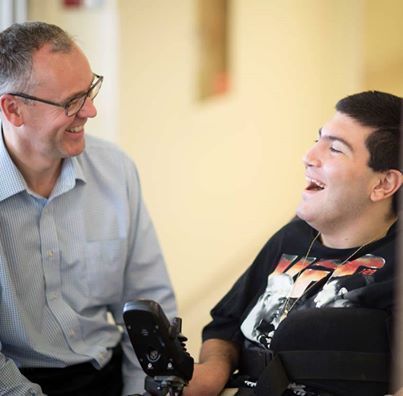Dr Jan Willem Gorter
CP-NET Executive Committee Member
Tell us about yourself
I’m a Professor in the Department of Pediatrics & hold the Scotiabank Chair in Child Health Research at McMaster University. I supervise students from the undergraduate through to the postdoctoral level. As well, I work as a physiatrist at McMaster Children’s Hospital.

I was raised and educated in the Netherlands. I moved to Canada in 2008, and now live in the beautiful town of Dundas with my spouse and our dog, Brodie. While we visit the Netherlands three or four times a year, Ontario is now “home” for us as well. I like to take advantage of the natural beauty of our area and enjoy sailing on Lake Ontario. I also play the euphonium in the Dundas Concert Band.
What is your research about?
Focusing on the themes of family, function and fitness, my research aims to improve the physical health, mental health and well-being of children and youth with disabilities and their families. I have a special research interest in the transition from pediatric to adult healthcare services.
What have you enjoyed the most about your research?
As a clinician scientist, I don’t work in a lab – I work directly with teenagers in a clinic. I want to see what they are struggling with, and help them find ways to take charge of their health. At the same time, I’m very interested in understanding how the brain changes during adolescence and youth, such as the development of executive functioning abilities that are necessary for reasoning, problem solving and planning. I find that what I learn from working with teenagers in the clinic links back to my research interests in brain development, which again informs my clinical practice. I enjoy that this is a complete cycle.
Treating complex conditions requires us to work together – it’s a big puzzle and no one has all of the pieces. We need to work in partnership, and that includes families and young people.
What motivates you to do research?
I want to know how things work and how we can do things better, which is what evidence-based research is all about. I’m also motivated by the interdisciplinary nature of childhood disability research. Treating complex conditions requires us to work together – it’s a big puzzle and no one has all of the pieces. We need to work in partnership, and that includes families and young people.
Tell us about your “Eureka!” Moment
After 15 years of training as a physician, I thought I was ready to help children with disabilities and their families. However, I soon discovered that my medical knowledge wasn’t enough. I needed a wider lens to see how these children fit within their families, and how their families fit within the community. It was an important realization that helped lead me in the direction of the “F-words”.
This interview originally appeared on CurioCity, the online resource centre for Let's Talk Science.
